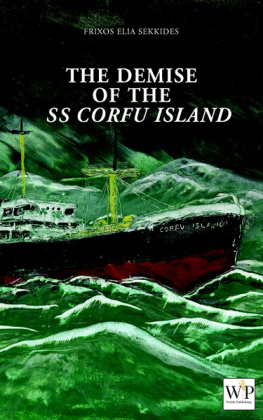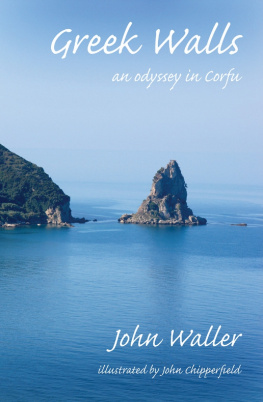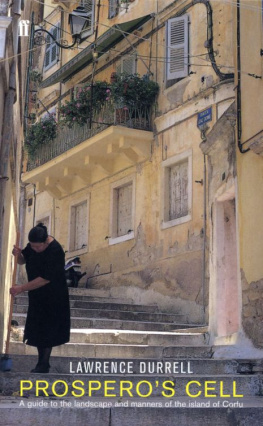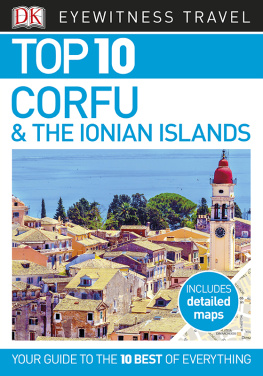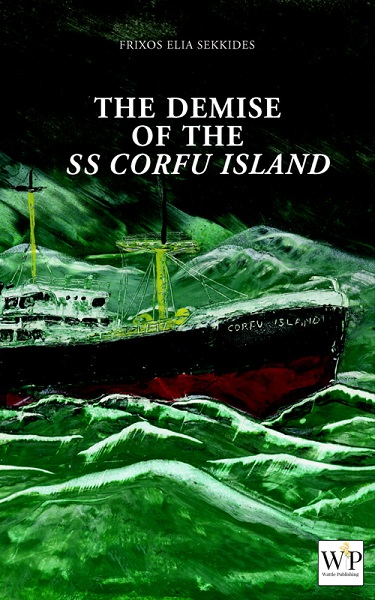
The Demise of the
SS Corfu Island
by
Frixos Elia Sekkides
Wattle Publishing Ltd
Third Floor, 207 Regent Street,
London W1B 3HH
www.wattlepublishing.com
Published in Great Britain by Wattle Publishing Ltd in 2012
Copyright 2012 by Frixos Elia Sekkides
The moral right of the author has been asserted
A catalogue record of this book is available from the British Library
ISBN 978-1-908959-09-6
First Published in 2012 by
En Tipis Publications, Chilis, 26, 1020 Pallouriotissa, Nicosia, Cyprus.
All rights reserved. This Work is protected by Copyright. No part of this publication may be reproduced, stored in a retrieved system, or transmitted, in any form or by any means, electronic, mechanical, photocopying, recording, or otherwise, without the prior permission of the copyright owner.
Contents
Born in Cyprus, Frixos Elia Sekkides graduated from the Kyrenia Greek College and studied Radio and Radar at Norwood Technical College, London. After spending fifteen years at sea as a Radio Officer, he returned to London, where he now lives.
To my friend Frixos Sekkides: for the treasured memories of an incident that happened on December 20th, 1963, aboard the SS Corfu Island, a ship that died in the country in which she had been built twenty years earlier; and for being the first and only sailor who was able to come back and renew contact with his saviors, forty-four years later.
On December 20th, 1963, I was returning from boarding school to spend the Christmas holidays with my parents. Aged fourteen, I had just spent four long months away from home, away from friends, far from everything. To say that the hurry to get home occupied my thoughts would be an understatement. The desire to see the place where I grew up was taking all the space in my mind and for months, I had been counting the days until I returned to my friends and family. However, unexpectedly, a violent storm in December would delay my arrival by almost two days, by destroying the only bridge linking the island of my arrival to the village where my parents lived.
Unfortunately, I did not suspect that barely a mile from the collapsed bridge which deprived me of the warmth of home, a large ship had miraculously run aground; miraculous because usually the announcement of shipwrecks around the Magdalen Islands meant an almost certain loss of life. Fortunately, for once, this was not the case.
You will then understand my excitement when, forty-seven years later, I was told that one of the surviving sailors of the wreck, was looking for people who had saved his life in order to thank them not only for this deeply human gesture, but also because it had been done at the risk of their lives. And so, that's how Frixos Elia Sekkides entered my world: first through the door of journalism; and then through the door of friendship. The publication of the book, The Demise of the SS Corfu Island, is the result of a friendship that has not diminished since our first meeting in September 2007. It is with particular attention that I read the story of my friend Frixos. Nothing surprised me in this book because I know the man behind the words, written over a memory that still holds the road well. Those who will read this story will discover with delight the life of a generous, honest, and uncompromising man. In simple words, he tells about most of his life as a sailor, not only the sinking of the ship flying the flag of Lebanon, called SS Corfu Island. Some readers may find strange the display of certain parties and encounters spread here and there in his story, but it must be remembered that the sailor's life at that time was very special, especially for the single man that was Frixos Sekkides. It's no secret then why our mothers were saying to our fathers when they wanted to sail away, Its me or the ships, meaning me or those women in every port. And there was no possible escape from negotiation. Some left anyway, others remained anchored. The story is the story of a past without compromise, as open as the author, generous and as truthful as his faithful and prodigious memory.
Men such as Frixos were risking their life in every storm, on ships that were at the end of their capabilities, without radar and without the modern facilities of today. No wonder those men who flirted almost daily with death, had one wish when they returned to port; to take all that life had to give them at that very moment.
Some will say that the sea always gets even and takes its toll whenever she wants. In fact, a year later, Nature, in a cruel revenge, took the lives of four Captains and a fisherman, leaving twenty-one orphans on the Magdalen Islands. Frixos Sekkides was lucky and he knew it. Forty-four years later, he returned to the scene of the wreck, just to say thank you to those who saved his life.
Everything else is in the book you are holding.
GEORGE GAUDET
Retired columnist and journalist
Magdalen Islands, Quebec, Canada
On October 10th, 2007, I found myself on board an Airbus 330 belonging to Air Canada, Flight AC 865, bound for a group of small islands called the Magdalen Islands, with a population of around 14,000, in the middle of the Gulf of St Lawrence. Forty-four years ago, in perilous conditions, the ship I joined as a radio officer had been lost there. I was very apprehensive about returning to the Islands. Was the shipwreck still there? Would the local people, who had endangered their lives to rescue us, remember the event after so many years?
For a man of seventy-seven, of an acrophobic disposition, the determination to fulfill my lifes dream to revisit the Magdalen Islands, and have the opportunity to thank all those people in person, had become stronger than my fear of heights. The faith that my young friend Maria (Maro) had bestowed upon me, insisting that I grab this monumental opportunity, contributed to making this voyage possible!
The moment the Airbus 330 was airborne, I began by asking my neighboring passengers whether they had ever visited the Magdalen Islands and, if so, whether they recalled the loss of the SS Corfu Island in December 1963. Was I looking for a needle in a haystack? Maybe so! But I really believed I would meet someone who recalled the event. No useful information came out of the first leg of my journey. The second leg entailed a flight from Montreal, on a smaller turbo propeller fifty-seater aircraft, with a stop in Quebec City, and a further one at Gaspe, before the final landing on the Magdalen Islands. The only tangible thing I carried with me was a radio amateur's call-sign card from the Mathematics teacher, Father Franois, who became the eventual Principal of Saint-Pierre College in the parish of La Verniere, on the Magdalen Islands.
I was planning to search through the archives of the local newspapers, the local radio station and the town hall; a daunting task! I had to stay overnight in Montreal as there was no same-day connecting flight to the Magdalen Islands. Early on the morning of October 11th, I left the hotel for the airport to catch the flight for the final destination, the Magdalen Islands, which I had been dreaming about for so long! I arrived at the Gate 28 waiting room where I was met by a few other fellow passengers. I tried to strike up a conversation with them regarding the SS Corfu Islands fate. There was one person in the waiting room, a young lady called Celine Beland, who was going to the Islands. She intended to continue her journey by boat to another tiny island of the Archipelago, in search of a small property to buy. It was now time to board the aircraft.
Next page
